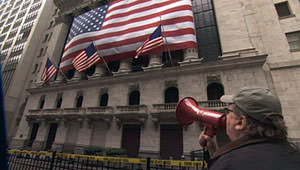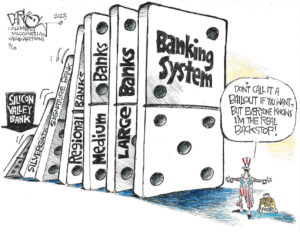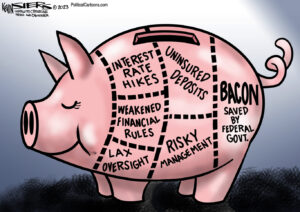Capitalism Means Never Having to Say You’re Sorry
Michael Moore's latest look at what's wrong (and right) with America is a lot better -- and a lot more radical -- than some of the brie-eaters reviewing it think It's a cry from the soul of a man who sees the whole country turning into his hometown hell of Flint, Mich.
Editor’s note: “Capitalism: A Love Story” opens nationwide Friday, Oct. 2. Rated R for language / 120 minutes.Michael Moore’s
latest look at what’s wrong (and right) with America is a lot better — and a lot more radical — than some of the brie-eaters reviewing it think. It’s a cry from the soul of a man who sees the whole country turning into his hometown hell of Flint, Mich.
That seems like egomania to some. David Denby of The New Yorker writes that Moore is “mesmerized by Flint’s tragedies.” But Moore is right. This recession, with its rampant foreclosures, imploding auto industry, greedy fat cats and dazed and desperate commoners, has been highly reminiscent of the director’s first film, the classic “Roger and Me.”
The Village Voice calls “Capitalism: A Love Story” a “point-by-point retread” of that documentary, but that’s not entirely fair. Moore looks to his 1989 film as a historical document of the moment when the first shock waves of modern steroidal capitalism could be felt. But Moore doesn’t just return to his roots, he comes to view — with the help of the Catholic Church — capitalism as a fundamentally evil system that has destroyed American democracy and demands a revolution.
As someone who might have been tempted by popularity and success, Moore deserves credit for not resting on his millions and producing a safe pop documentary, something mildly provocative but ultimately palatable. Instead, “Capitalism” is a call to class warfare, with Moore cleverly dividing the classes into the top 1 percent and everyone else, including himself.
That’s not a divide of his making. The American economy over the last 30 years has showered the richest 1 percent with wealth at the expense of the rest of us. Sure, we’ve heard it before, but Moore digs up some dirt that breathes new life into the statistic — something that happens a lot in “Capitalism.”
The film’s detractors say it’s over the top and unfocused. Denby writes that it’s “not a good movie or a coherent exposition of the meltdown” and “By the end of the movie, baffled, [Moore] resorts to his old gags.”
But Michael Moore is not a clown. He is a wildly successful innovator whose “gags” are usually quite effective. Moore begins the movie by placing the audience inside a home undergoing foreclosure. The residents huddle together while sheriff’s deputies surround the house and literally beat the door down. The scene resembles a horror movie, complete with splintering wood and booming sound, but it is inescapably real and, ultimately, very sad.
It has been all too easy for the chattering class (readers of The New Yorker, perhaps?) to ignore the suffering of the average American in this crisis. News coverage dwells on the rebounding Dow, while food banks run out of stores. Moore’s portraits of down-on-their luck Americans are haunting.
True to form, the movie is also quite funny. In a flash of genius, Moore dubs a classic Hollywood Jesus, who refuses to heal the poor and demands deregulation. Jesus actually has a big role in the movie, which is much more religious than you might expect. For Moore, this is a moral question, one that was answered 2,000 years ago by a god who loved the poor above all and felt very different about the rich. The revelation that capitalism is evil doesn’t come from the director, but his bishop.
In the end, Moore does not have nearly enough time to make a full indictment of capitalism. He could have gone the Ken Burns route and taken over PBS for a month and a half to prosecute a tedious case against profit. Instead, he weaves together a few horrifying examples, casts new light on familiar ground and hammers away at the conclusion that our economic way of life inevitably destroys everything it touches.
The purpose of this movie is not to educate so much as it is to inspire. The workers squatting at the Republic Windows and Doors factory in Chicago, whom you may recall from the 2008 election, became symbols for what might be achieved if we band together and resist. Moore presents Barack Obama’s historic election in a similar fashion — the remarkable accomplishment of millions of Americans defying the oligarchs. But Obama’s role in this mess makes for a gaping void in “Capitalism.”
Moore completely lets the president off the hook. He criticizes Obama’s top economic adviser, Larry Summers. He makes the case that Treasury Secretary Timothy Geithner (conspicuously labeled “2009-present”) has been an abject failure at everything he has done. He even points out that the financial industry tried to buy Obama with millions in donations.
But just as he is about to swing, Moore drops his bat, interrupting his own argument with footage from that memorable night when Barack Obama became the first black man elected president. It’s a bit of a time warp. We’re supposed to be mad at the people working for Obama now, but when we think of the man in charge, we should focus on the election.
Another deficiency is Moore’s plea at the end of the movie for the audience to join him in resistance. But how exactly? At least Glenn Beck had the nerve to organize a march. The movie also drags in places, and the inexplicable appearance of character actor Wallace Shawn is simply distracting.
It’s not a perfect movie, but it is essential for these times. “Capitalism: A Love Story” will make your blood boil. Maybe, Michael Moore hopes, you’ll do something about it.
Your support matters…Independent journalism is under threat and overshadowed by heavily funded mainstream media.
You can help level the playing field. Become a member.
Your tax-deductible contribution keeps us digging beneath the headlines to give you thought-provoking, investigative reporting and analysis that unearths what's really happening- without compromise.
Give today to support our courageous, independent journalists.




You need to be a supporter to comment.
There are currently no responses to this article.
Be the first to respond.